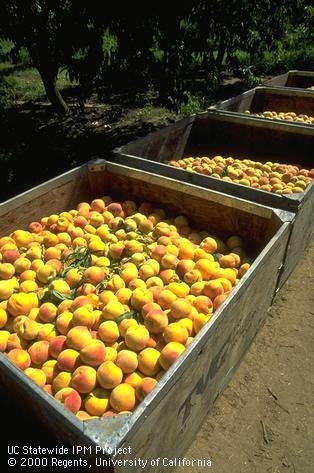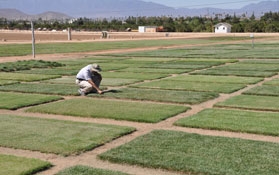Posts Tagged: UC Riverside
Budget cuts felt on agricultural campuses
An article by Ching Lee in today's Ag Alert focused on the effects of budget cuts on agricultural student programs at California universities. "Budget cuts have had a profound effect on all areas of the campus," Diane Ullman, associate dean for undergraduate academic programs at UC Davis College of Agricultural and Environmental Sciences, told the reporter. She explained the college faces challenges keeping agricultural production facilities, instructional equipment and technologies updated to deliver hands-on education — even though the office has seen student applications increase by 70–80 percent.
Tom Baldwin, dean of UC Riverside College of Natural and Agricultural Sciences, also commented on the challenges of serving students in the face of diminishing resources, saying the university is "moving heaven and earth" to do so.
The cuts are being felt at on-campus farms as well. Raoul Adamchak, of the UC Davis Student Farm, explained that the market garden generates its own income and provides a lesson to students on self-sustaining businesses. "Things cost money, and these are part of the expenses of farming, so it has to be factored in. They have to make decisions based on the cost of things and the returns," he said.
Peach association to major retailer: Buy U.S.-grown
Christine Souza, Ag Alert
The California Canning Peach Association has asked Target to consider California fruit for its Market Pantry-brand canned peaches, which are currently a product of China. Wal-Mart carries a comparable product made from California cling peaches, with a lower retail price.
Reporter Christine Souza sought expert commentary from Roberta Cook, UC Cooperative Extension marketing specialist at the Davis campus, on the current market for California cling peaches. "When you are talking about processed items, if another country can produce it a lot cheaper than you, then you will be vulnerable to competition. And consumer preferences have moved towards fresh. So [California cling-peach businesses] are hit by both factors," she told the reporter.
Related ANR News Blog post: Chinese farmers take a bite out of the California cling-peach market
Water-efficient plants highlighted at turfgrass event
Reporter Laurie Lucas covered UC Riverside's turfgrass field day for The (Riverside) Press-Enterprise. Approximately 200 homeowners, park managers, water experts, scientists, nursery professionals and golf course supervisors attended the event. One of the 13 projects highlighted at the Turfgrass Research Facility's event examined water-efficient groundcover, including rosemary, thyme and iceplant. UC Cooperative Extension specialist Donald Merhaut commented on the plants' response to reduced water. "Most of the 18 species we grew with limited irrigation did well," he told the reporter. "But the geraniums showed the most direct heat stress." The article also highlighted trailing purple lantana, blue rug juniper, honeysuckle, vygie, grey saltbush and morning glory as other alternatives for cool-season grasses.
UC Riverside called The Idea Factory
The Riverside Press-Enterprise published an eight-page special report about UC Riverside in the Sunday newspaper, calling the institution "The Idea Factory."
"Not only students graduate to the real world. Ideas do, too," the report's introduction says.
One of the articles in the special report focuses on industry support of agricultural research at UC Riverside. The story traces the roots of UC Riverside's agricultural programs from its establishment as a citrus research station in 1907 through a history of accomplishments in plant breeding, insect pest and disease control.
Two examples of industry support for UCR agricultural research were included in the story, written by Mark Muckenfuss and Jack Katzanek.
- With each case of avocados sold, growers make a small donation, usually just a few cents per case, to the California Avocado Commission, which in turn helps fund some of the UCR's war on root rot and other studies.
- Some of UCR's efforts to control pests are funded by the Citrus Research Board, to which citrus farmers pay dues.
In addition, UCR's patented discoveries are used by private agriculture through licensing agreements. Most of UCR's licensing agreements - 142 out of 170 last year - are related to agricultural patents.
UC Riverside senior public information representative Iqbal Pittalwala said the campus's strategic communications office worked closely with the newspaper for several months to create the special report.
"And it was the Press Enterprise that came up with 'The Idea Factory,'" Pittalwala said.

Greenhouses for ag research at UC Riverside.
Are Americans losing their taste for grapefruit?
Yearly per capita consumption of grapefruit has been on a steady decline since the late 1970s, according to an article in the Riverside Press-Enterprise. To boost the fruit's popularity and keep the industry in business, growers in Southern California have organized a cooperative and hired PR expert Kari Birdseye to put together a marketing program.
In 1976, Americans ate almost 9 pounds of grapefruit per year. As a late-baby boomer, that doesn't come as a big surprise to me. The popular "grapefruit diet" was one of the first weight-loss fads I can remember. By 2007, per capita consumption dropped to 2.76 pounds, the article said.
Birdseye told Press-Enterprise reporter Leslie Berkman that one of the cooperative's goals is to extend the appeal of grapefruit to the younger set. In the U.S., it seems to be eaten by people who are middle-aged and older.
Another issue is that warning labels on some drugs for lowering cholesterol and blood pressure say they should not be taken with grapefruit juice. Birdseye said she is enlisting scientists at UC Berkeley to review the research that has been done on the interaction of grapefruit with drugs and on the nutritional benefits of grapefruit, such as in fighting obesity, Berkman reported
"The first step is to do a comprehensive review of the scientific literature to determine what health benefits can be authentically claimed and to see where there might be some holes where more research is required," Birdseye was quoted. "Let's get the science behind us."
According to the article, Birdseye is planning to meet with Thomas Baldwin, dean of the College of Natural and Agricultural Sciences at UC Riverside, to find ways UCR experts can help grapefruit growers, such as by breeding grapefruit varieties to enhance existing health benefits.
Tracy Kahn, curator of the UCR citrus variety collections, noted in the story that one reason for the growing popularity of pink grapefruit is that the pigment that makes it rosy, lycopene, is very healthful.

Pink grapefruit (Photo: Wikimedia Commons)


